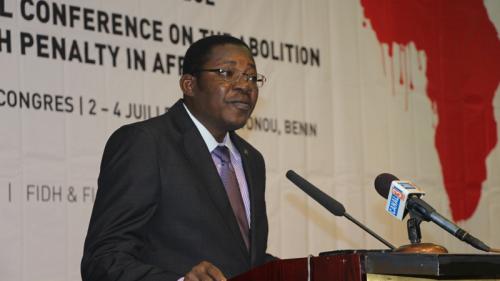08 July 2014 :
Declaration of the Continental Conference on the Abolition of the Death Penalty in Africa (the Cotonou Declaration)Recalling the Universal Declaration of Human Rights which guarantees the right to life, liberty and security of person under Article 3;
Bearing in mind the provisions of the Constitutive Act of the African Union in Article 3(h), which enshrines the objective of the African Union to promote and protect human rights, and Article 4(o), which requires respect for the sanctity of human life;
Recalling also that the right to life is a fundamental human right guaranteed by Article 4 of the African Charter on Human and Peoples' Rights which enshrines the absolute prohibition of the arbitrary deprivation of life;
Further Recalling Article 6 of the International Covenant on Civil and Political Rights, Articles 6 and 37 (a) of the Convention on the Rights of the Child, Articles 5(1)(3) of the African Charter on the Rights and Welfare of the Child, and Articles 4(1)(2)(j) of the Protocol to the African Charter on Human and Peoples' Rights on the Rights of Women in Africa;
Recalling Resolution ACHPR/Res. 42(XXVI) 99: Resolution Urging States to Envisage a Moratorium on the Death Penalty;
Further Recalling Resolution ACHPR/Res.136 (XXXX1111)08: Resolution Urging States to Observe a Moratorium on the Death Penalty;
Noting the "Study on the Question of the Death Penalty in Africa" adopted by the Commission at its 50th Ordinary Session from 24 October to 7 November 2011 in Banjul, The Gambia;
Noting further that Article 6 of the International Covenant on Civil and Political Rights refers to abolition of the death penalty in terms that strongly suggest that abolition is desirable;
Convinced that everyone's right to life is a basic value in a democratic society and that the abolition of the death penalty is essential for the protection of this right and also for the full recognition of the inherent dignity of all human beings;
Reaffirming the commitment of the African Commission on Human and Peoples' Rights to promote the right to life and human dignity as fundamental rights;
Believing that abolition of the death penalty contributes to enhancement of human dignity and progressive realisation of human rights;
Convinced that all measures to abolish the death penalty should be considered as progress in the enjoyment of the right to life;
Wishing to strengthen the protection of the right to life guaranteed by the African Charter on Human and Peoples' Rights;
Considering that the evolution that has occurred in several member States of the African Union expresses a general tendency in favour of abolition of the death penalty;
Welcoming further the efforts of various sectors of civil society at the national, regional and international levels to achieve the abolition of the death penalty;
Determined to urge African States to take the final step in order to abolish the death penalty in all circumstances;
Guided by the purposes and principles contained in the African and United Nations Instruments;
Noting ongoing local and national debates and regional initiatives on the death penalty, as well as the readiness of an increasing number of African States to do away with capital punishment;
The Continental Conference on the abolition of the Death Penalty in Africa hereby:
1. Calls on the African Union Member States to adopt the Additional Protocol to the African Charter on Human and Peoples' Rights on the Abolition of the Death Penalty in Africa.
2. Expresses its deep concern about the continued application of the death penalty in a number of African States;
3. Welcomes the steps taken by a growing number of African States to reduce the number of offences for which the death penalty may be imposed and the decision made by an increasing number of States to apply a moratorium on executions, followed in many cases by the abolition of the death penalty;
4. Deeply appreciates the growing number of African States that have abolished the Death Penalty;
5. Calls upon African States which have abolished the death penalty not to reintroduce it, and encourages them to share their experience in this regard;
6. Calls upon African States that have not yet done so to consider abolishing the death penalty statutorily or constitutionally, and to consider acceding to or ratifying the Second Optional Protocol to the International Covenant on Civil and Political Rights, aiming at the abolition of the death penalty;
7. Further calls upon African States to vote in favour of the proposed United Nations General Assembly Resolution to be adopted this year calling for a universal moratorium on executions with a view to abolish the death penalty;
8. Further invites civil society organisations to remain seized with the matter of the death penalty and, in particular, monitor scheduled executions and alert the African Commission's Working Group on the Death Penalty, Extrajudicial, or Summary Killings in Africa and the international community in a timely manner where there is reason to believe that such an execution will occur;
9. Encourages Professional Groups to continue to conduct research on issues related to the question of the death penalty;
10. Urges National Human Rights Institutions to monitor, document and report on death penalty and execution cases to the African Commission on Human and Peoples' Rights;
11. Encourages national Human Rights Institutions, Civil Society, the Media and other stakeholders to continue conducting advocacy and awareness raising on the abolition of the Death Penalty in Africa;
12. Finally calls on legislators in Africa to review their national laws and enact legislation abolishing the death penalty and to support the ratification of the Additional Protocol to the African Charter on Human and Peoples' Rights on the Abolition of the Death Penalty in Africa.
Done on 4 July 2014, in Cotonou, Republic of Benin








